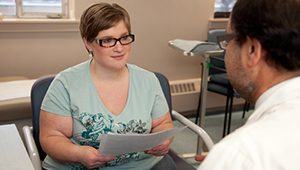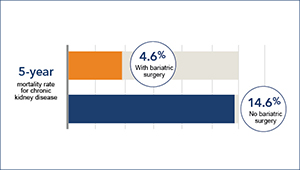Obesity
Research overview
“Obesity is the number-one health problem in the United States because it negatively affects our population’s health more than any other condition,” said Kaiser Permanente Washington Health Research Institute Senior Investigator David Arterburn, MD, MPH. Kaiser Permanente Washington researchers are doing practical research to learn how doctors, patients, families, employers, and policymakers can best work together to prevent and treat obesity.
“We’re focusing on three ways to halt the obesity epidemic,” said Senior Investigator Dori Rosenberg, PhD, MPH. “We’re helping to change obesity-promoting environments, bringing evidence-based prevention and treatment programs into health care systems, and helping people develop lifelong healthy diet and activity habits.”
Kaiser Permanente Washington obesity research areas include:
- reducing sedentary behavior and promoting physical activity and healthy diet in various age groups, populations with chronic conditions, and families;
- shared decision making to help patients find the best way to a healthy weight;
- implementing health coaches in primary care to support behavior changes;
- social networks that support lifestyle change programs;
- relationships between medications and genetic factors in developing obesity;
- health system, community, and national policies that address obesity;
- relationships between obesity and depression, diabetes, and other conditions; and
- long-term benefits and risks of bariatric (weight loss) surgery.
“Obesity is caused by many factors, so at Kaiser Permanente Washington, we’re working on many levels,” said Paula Lozano, MD, MPH, a senior investigator and Kaiser Permanente Washington’s assistant medical director for preventive care. “We’re improving health care to help people who are obese now. But since obesity is a societal problem, we’re also studying how to change our homes and workplaces and neighborhoods to create more healthy environments.”
Recent publications on Obesity
Arterburn DE, Kushner RF, Courcoulas AP Long-term Complications of Bariatric Surgery-Reply 2021 Jan 12;325(2):186-187. doi: 10.1001/jama.2020.22487. PubMed
Lewis KH, Callaway K, Argetsinger S, Wallace J, Arterburn DE, Zhang F, Fernandez A, Ross-Degnan D, Dimick JB, Wharam JF Concurrent hiatal hernia repair and bariatric surgery: outcomes after sleeve gastrectomy and Roux-en-Y gastric bypass 2021 Jan;17(1):72-80. doi: 10.1016/j.soard.2020.08.035. Epub 2020-09-03. PubMed
Buszkiewicz J, Rose C, Gupta S, Ko LK, Mou J, Moudon AV, Hurvitz PM, Cook A, Aggarwal A, Drewnowski A A cross-sectional analysis of physical activity and weight misreporting in diverse populations: The Seattle Obesity Study III 2020 Dec;6(6):615-627. doi: 10.1002/osp4.449. Epub 2020-08-21. PubMed
Maciejewski ML, Smith VA, Berkowitz TSZ, Arterburn DE, Mitchell JE, Olsen MK, Liu CF, Livingston EH, Funk LM, Adeyemo A, Bradley KA Association of Bariatric Surgical Procedures With Changes in Unhealthy Alcohol Use Among US Veterans 2020 Dec;3(12):e2028117. doi: 10.1001/jamanetworkopen.2020.28117. Epub 2020-12-01. PubMed
Feigelson HS, Caan B, Weinmann S, Leonard AC, Powers JD, Yenumula PR, Arterburn DE, Koebnick C, Altaye M, Schauer DP Bariatric Surgery is Associated With Reduced Risk of Breast Cancer in Both Premenopausal and Postmenopausal Women 2020 Dec;272(6):1053-1059. doi: 10.1097/SLA.0000000000003331. PubMed
Researchers in Obesity
 David E. Arterburn, MD, MPHSenior Investigator |
 Allen Cheadle, PhDSenior Investigator, KPWHRI; Senior Research Associate, CCHE |
 Andrea J. Cook, PhDSenior Biostatistics Investigator |
 Maricela Cruz, PhDAssociate Biostatistics Investigator |
 Nicole M. Gatto, PhD, MPHPrincipal Collaborative Scientist |
 Beverly B. Green, MD, MPHSenior Investigator |
 Mikael Anne Greenwood-Hickman, MPHSenior Collaborative Scientist |
 Paula Lozano, MD, MPHSenior Investigator; Director, ACT Center |
 Dori E. Rosenberg, PhD, MPHSenior Investigator |
 Gregory E. Simon, MD, MPHSenior Investigator |











